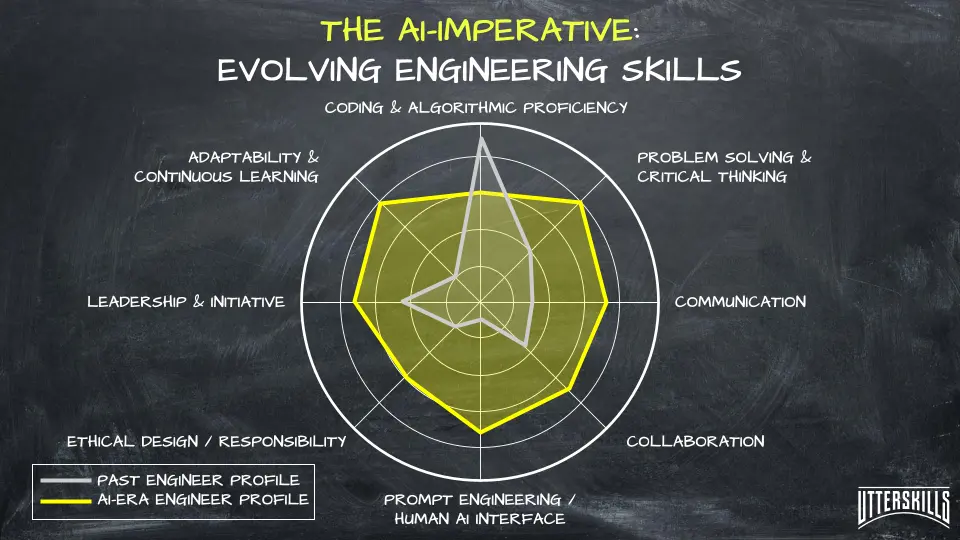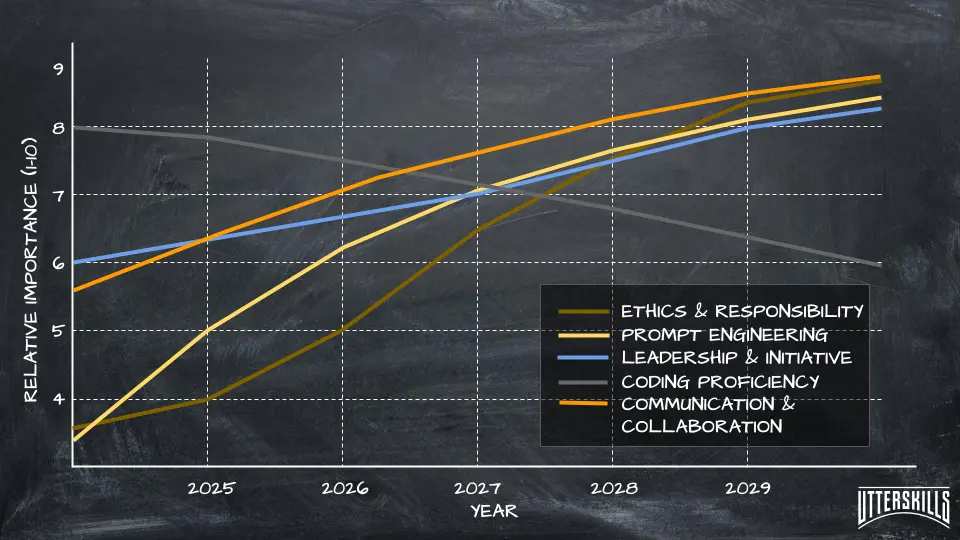As AI rapidly reshapes the landscape of software development, one truth is becoming clear: engineers who cultivate skills beyond code will thrive. This post explores why, and which competencies now define engineering success in the age of AI.

The Evolving Skillset of an Engineer: The radar chart illustrates the shift in core competencies for engineers from the pre-AI era to today's AI-driven landscape. Where coding once dominated, today's engineers thrive by balancing technical and human-centric skills.
For decades, the role of a software engineer was defined by coding proficiency. Your value was measured by the speed and elegance of your code, your mastery of complex algorithms, and your deep technical expertise in specific languages or frameworks. In this world, “soft skills” were a nice-to-have, often seen as secondary to technical prowess.
But the ground is shifting. The widespread integration of AI into software development is not a distant future - it's the present. AI is rapidly automating many of the routine, automatable tasks that once filled an engineer's day, from generating code snippets to refactoring and debugging. This isn't a threat; it's an imperative for the evolution of our profession. The core value of an engineer is moving beyond mere coding to a mastery of skills that AI cannot replicate.
The New Value Proposition: From Coder to Collaborator
AI acts as a powerful augmentative force, liberating engineers from mundane and time-consuming work. This enables them to redirect their focus towards more complex, creative, and strategic aspects of their roles. This transition fundamentally redefines the engineer's role, shifting them from manual coders to strategic collaborators who work in tandem with intelligent systems.
The most successful engineers are now those who can deeply understand business problems, communicate effectively, and lead projects with a high degree of adaptability. As an engineer, you are moving from being a “sous chef” who follows a recipe to a “head chef” who conceptualizes, designs, and orchestrates the entire solution. The unique human touch lies in conceptual brainstorming, innovative problem-solving, and intuitive design - tasks that machines cannot yet master.
This isn't just a time shift - it's a fundamental change in cognitive effort. The core work shifts from direct execution to abstract thinking and meta-level problem-solving.
Pause for a moment: If AI took over 70% of your daily, automatable tasks, what would you do with the rest of your time?
Blending Human and Technical Strengths
The rise of AI is blurring the traditional boundaries between technical and non-technical skills. As AI automates many routine technical tasks, the demand for human attributes like critical thinking and adaptability escalates. The proficiency of the future engineer will be defined by a “hybrid intelligence,” seamlessly integrating technical understanding with advanced human-centric capabilities.
Consider these concrete examples:
- Prompt Engineering: Crafting effective inputs for AI systems is a technical task, but its success relies heavily on communication clarity, logical structuring, and an understanding of intent.
- Code Validation: Evaluating and refining AI-generated code now demands a higher degree of critical thinking, oversight, and ethical judgment to prevent subtle errors and maintain quality standards. AI tools are not infallible, and errors might surface weeks or months later. Your human intervention transforms automated analyses into informed and reliable decision-making.
- Ethical Design: AI models are not neutral entities; they inherently reflect the values and assumptions of their creators and training data. This means engineers must consider not only what a system can technically achieve, but more importantly, what it should ethically do. Ethical considerations, such as fairness and privacy, are becoming integral functional requirements of software development, on par with performance or security requirements.
The Core Competencies of Modern Engineering
So, what are these core competencies that will define the modern engineer? The research points to a profound shift in emphasis:
- Problem-Solving and Critical Thinking: While AI can help with well-defined problems, engineers are increasingly tasked with navigating ambiguous challenges. The human role shifts from simply finding a solution to validating and refining AI-generated outputs with rigorous judgment.
- Communication and Collaboration: Communication is more vital than ever, serving a dual imperative: human-to-human interaction and human-to-AI interaction. Engineers must act as an interface, translating human intent for AI systems and interpreting AI outputs for non-technical stakeholders.
- Leadership and Initiative: Leadership is no longer reserved for formal managers; it's a vital skill for individual contributors. This new leadership paradigm extends to guiding not only human colleagues but also orchestrating the capabilities of AI as an integral “teammate”.
- Adaptability and Perpetual Learning: The rapid pace of change introduced by AI makes adaptability a fundamental necessity for staying relevant. A growth mindset and a commitment to perpetual learning are crucial for continuously adjusting how one works and what one's role entails.

As AI continues to evolve, engineers must expand beyond code. Skills like AI literacy, prompt engineering, and ethical decision-making are rising sharply in importance. Projections informed by data from World Economic Forum, LinkedIn's Work Change Report, Gartner, and Multiverse.
Data sources: World Economic Forum, LinkedIn's Work Change Report, Gartner, and Multiverse.
In an AI-driven world, your ability to lead, communicate, and reason is no longer a differentiator - it's the job.
The Call to Action
The traditional academic focus on hard skills has left a significant “skills gap” among graduates and even experienced professionals. As AI automates many of the technical tasks traditionally emphasized, these human-centric skills are now the new competitive advantage. This isn't just about professional development; it's about professional relevance and career survival.
Here are a few concrete, tactical steps you can take today:
- Embrace a Growth Mindset – Cultivate the belief that skills can be continuously developed and refined. View mistakes as learning opportunities, not failures.
- Seek Feedback and Mentorship – Proactively ask for constructive feedback on your communication and teamwork abilities. Connect with mentors who can offer insights on navigating career transitions or integrating AI into workflows.
- Cultivate AI Literacy – Invest time in understanding AI's capabilities and inherent limitations. Practice crafting effective prompts and queries to maximize its utility.
- Engage Interdisciplinary Learning – Actively interact with colleagues from other business streams to develop strong business acumen and strategic thinking.
The future software engineer will be defined not by the code they write, but by their profound ability to think deeply, lead with intention, and navigate complexity with empathy and strategic foresight. The AI imperative is clear: the time to master your skills beyond code is now. For a practical breakdown, see the 7 essential soft skills for software engineers.
Next up: In the second post of this series, From Execution to Oversight: Critical Thinking in an AI-Augmented World, we'll dive deeper into why judgment is your most valuable asset when working with intelligent systems.